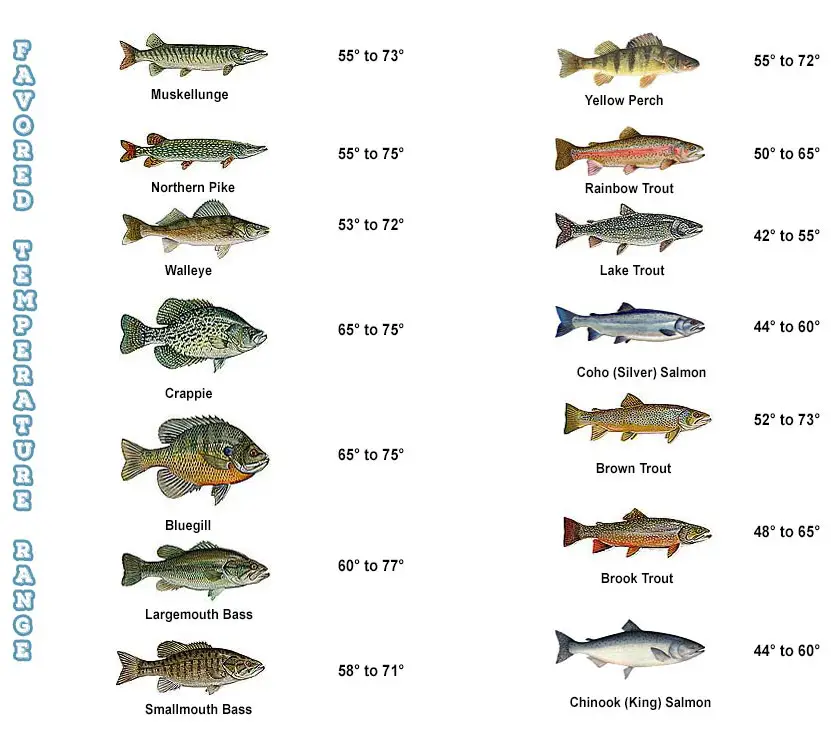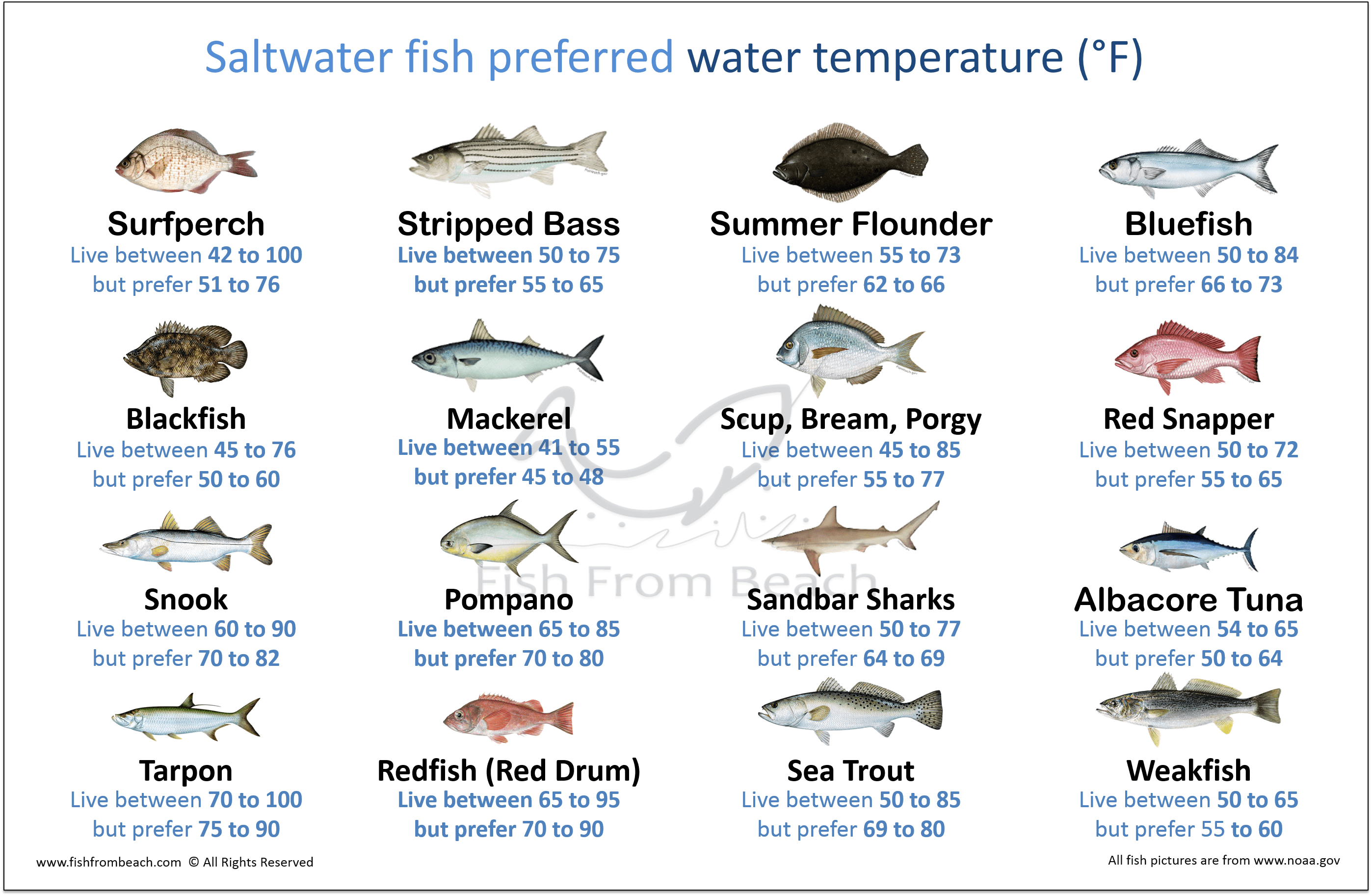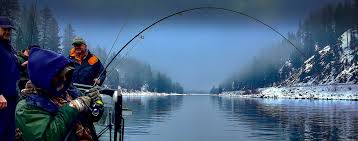Most fish are cold-blooded, which means their body temperature is regulated by the surrounding water. In fact, some fish prefer cold winter water to spring and summer. If you can stand the winter cold there are many species of fish waiting for you but you need to follow some advice from the guys that are on the ocean and on the lake’s ice no matter how cold it is because fishing won’t wait till Spring. What do you need to know when fishing in cold weather?
- The Species of Fish you’re fishing for
- The Fish’s preferred H2O Temperature
- Know the Fish’s location in the Water Column
- What baits to use
- To use smaller 2-3″ Bait size
- The best Waders to use in winter
- How to layer your clothing to keep warm
- How to retrieve a lure in colder water to be successful
In the world of Winter Fishing not only is the water colder the fish use a type of hibernation that lots of animals use to get through the coldest of temperatures which will slow down their metabolism but they still move and still eat making them a viable target on the ocean or the lake. Like they say “Any day on the water fishing is better than a day not on the water fishing” Let me get an Amen on that!
Introduction:
As temperatures plummet, most fishing enthusiasts store away their gear and wait for spring. However, winter presents a unique opportunity for a rewarding fishing experience, provided that you understand the ropes. Welcome to our comprehensive guide on “How to Fish in Cold Weather: Winter Fishing Tips to Catch More.” Whether you’re after trout, bass, or pike, this article equips you with the necessary methods and strategies to outwit the cold and master the art of winter fishing, turning the chilling winter landscape into your own personal fishing haven.
Tactical Approach to Winter Fishing in Cold Weather
Fishing in cold weather isn’t just throwing a line in the water and hoping. It requires special tactics in cold weather to reel in the big ones. This is particularly valid for those hardy anglers looking to fish in winter, which provides its own unique challenges. Winter fishing can be an exciting adventure or a rough battle with the elements, depending on how prepared you are for the winter, cold, weather. In colder weather, fish behave differently, move slower, and eat less, making it tougher to hook them, especially if you’re doing bank fishing.
But winter freshwater fishing can also provide unique opportunities. Bass, for example, like to congregate in certain areas during winter. It’s not that bass only appear four times in the waterbody – it’s that they gather tightly, and once you find them, you can catch multiple bass one after the other. In other words, when you find one bass, you’re likely to find a few more. This is where the correct bait comes into play. Bait plays an integral role in getting the bass to bite your hook.
 When we talk about bait, we can’t ignore the importance of jigs and lures. One effective winter lure is the jigging spoon. With correct rigging, they can imitate the small fish bass feasting in winter. But as you know, lures are just one part of the equation.
When we talk about bait, we can’t ignore the importance of jigs and lures. One effective winter lure is the jigging spoon. With correct rigging, they can imitate the small fish bass feasting in winter. But as you know, lures are just one part of the equation.
Choosing the right fishing line and hook is essential. A thinner fishing line is better because it’s less likely to spook the fish and also, there’s less resistance in the water, which can make a difference in bait presentation a lot lucid. And don’t forget the hook, the simple hook should be sharp enough as you don’t want to miss the chance of hooking the bass when you find one.
Another essential gear of the winter angler is the boat. A compact but sturdy fishing boat is a perfect companion for winter fishing. Different boat dimensions facilitate different fishing styles.
For casual anglers, a shallow boat might be beneficial, allowing you to cast out from the stability of your boat and fish with jigs or lures. For more serious anglers, try a deep fishing boat that allows you to follow the fish and stay on top of them in this cold time of the year. Remember, regular boating checks are fundamental for safety, especially in winter when there may be more complications.
If you don’t own a boat, you can still be an accomplished winter angler from the bank. Here, lures such as blade baits work tremendously well. This kind of bait works for a variety of fish, offering you more than bass.
Ultimately, successful winter fishing comes down to time, patience, and using the elements to your advantage. Whether you’re fishing from a boat, or on the shoreline, mastering the time-tested techniques will always help. It’s about understanding the rhythms and behaviors of the fish and adjusting your tactics accordingly. So the next time you decide to fish in cold weather, make sure to bring your winter-specific gear, and above all, stay alert, patient, and most of all warm.
Active Cold Water Freshwater Fish
A crappie is a fish that is well adapted to frigid temperatures in a lake. It has to have an exact perfect combination of fertility, cover, and abundant forage, along with anglers willing to let a few grow. The crappie is a popular North American panfish related to the Sunfish There are two closely related species: the white crappie, and the black crappie.
Despite the names, black and white crappies are similar in color, ranging from dark olive to black on top, with silvery sides and black blotches and stripes. The pattern of the dark blotches is different between the subspecies.
Northern Pike northern pike is a species of carnivorous fish of the genus Esox. They are typical of the brackish and fresh waters of the Northern Hemisphere. They are known simply as a pike in Britain, Ireland, and most of Eastern Europe, Canada, and the United States.
Walleye-The walleye also called the yellow pike or yellow pickerel is a freshwater perciform fish native to most of Canada and to the Northern United States. It is a North American close relative of the European zander, also known as the pikeperch.
Trout-Trout is a species of freshwater fish belonging to the genera Oncorhynchus, Salmo, and Salvelinus, all of the subfamily Salmoninae of the family Salmonidae. The word trout is also used as part of the name of some non-salmonid fish such as Cynoscion nebulosus, the spotted seatrout, or speckled trout. The most popular or at least one of the most popular freshwater fish.
Active Cold Water Saltwater Fish
Striped bass: Year-round open season. Be careful where you fish for these fish; there is no closed season for saltwater striped bass but there are sizes and limits so check with the State.
 Striped Bass, also called Atlantic striped bass, striper, linesider, rock, or rockfish, is an anadromous perciform fish of the family Moronidae found primarily along the Atlantic coast of North America. It has also been widely introduced into inland recreational fisheries across the United States. Striped Bass found in the Gulf of Mexico is a separate strain referred to as Gulf Coast striped bass.
Striped Bass, also called Atlantic striped bass, striper, linesider, rock, or rockfish, is an anadromous perciform fish of the family Moronidae found primarily along the Atlantic coast of North America. It has also been widely introduced into inland recreational fisheries across the United States. Striped Bass found in the Gulf of Mexico is a separate strain referred to as Gulf Coast striped bass.
Winter flounder-Open season from March 1 to December 31, but these fish are typically found in New Jersey between November and May. The Winter Flounder, also known as the black back, is a right-eyed flatfish of the family Pleuronectidae.
It is native to the coastal waters of the western North Atlantic coast, from Labrador, Canada to Georgia, United States, although it is less common south of Delaware Bay.
Baits, including bloodworms, clams, shrimp, and squid, should be fished on the bottom. Available all winter long. Using a chum pot or a device to stir up the bottom will often improve your success
Cod-Cod inhabits deep, offshore wrecks and reefs, usually during the colder seasons. Cods are generally taken on bait (clams or cut bait) on or near the bottom, but, at times, they can be enticed with a jig. Cod is popular as a food with a mild flavor and dense, flaky, white flesh. Physically, the Atlantic Cod and its close relatives are noted for being the only group of fishes that have three distinct dorsal fins (along the back) and two distinct anal fins (along the ventral surface). Atlantic cod spend most of their time on or near the seafloor sometimes coming up the water column.
Mackeral- Atlantic mackerel is iridescent blue-green on the back with a silvery-white underbelly. They have 20 to 30 wavy black bars that run across the top half of their body and a narrow dark streak that runs below these bars along each side. Their body is spindle-shaped, tapering at both ends. Their two large dorsal fins are gray or dusky. The pectoral fins are black or dusky at the base, and the tail fin is gray or dusky. They like to stay active in the coldest of water so it won’t matter what the temperature is to them anyway.
The Influence of Water Temperature on River Fishing
Fishing, especially river fishing, isn’t simply about throwing your line into the water and hoping for the best. It’s more strategic, especially when it comes to understanding the influence of water temperature on the behavior of different fish species. In winter, when most temperatures plummet, the temperature of the rivers is no exception. The water acquires a chilly demeanor, but does this cooler temperature spell doom for your fishing endeavors? Far from it.
With the world outside freezing, it’s often assumed that all fish go into hibernation mode. While it’s true that decreased water temperature in winter does impact the fish’s metabolism, it certainly doesn’t ring a death knell for your winter river fishing ventures. What happens is that a drop in water temperature tends to slow down fish activity. The once vibrant, and dashing fish become somber, barely moving around, but they can still be targeted and caught. All you need to know is where they might be hiding.
Crucially, the mantra is about changing our fishing approach according to water temperature. In summer, river fishing is a straightforward affair. The warm water makes fish behave in a predictable manner. They swim around actively and respond quickly to lures and baits. But come winter, and the cool water temperature changes the game. Fish become sluggish due to metabolic restrictions. They tend to congregate in deeper, warmer parts of the river or find pockets where the temperature is a touch more tolerable than in other areas.
So our approach should mirror this change in the fish’s behavior due to cooler temperatures. Unlike in warmer months, it’s beneficial to fish in rivers during the warmest part of the day, when the water temperature might have increased a few notches. We gradually cast our lines, allowing the bait to sink deeper, patiently waiting for the fish to bite. Haste has no place in winter river fishing, and experience tells us that slow and steady wins the race.
Understanding water temperature is the key to successful river fishing in winter. Keep in mind that just as we humans seek warm places in winter, so do fishes. Learning to read the rivers, and the seasonal changes in water temperature, and adapting to them will significantly enhance your chances of success. And remember, your love for fishing doesn’t have to freeze just because the temperatures drop across the rivers.
Now equipped with a cooler mindset, it’s time to step out and embrace winter river fishing. Wrap up warm, pack your preferred fishing gear, and test the temperature of your favorite rivers. Warm coffee might be your companion to fight the cold, but the thrill of managing to coax a fish out of freezing water truly adds a distinctive warmth to your winter fishing experience.
Winter Fishing Tips: How to Catch Bass and Trout in Cold Weather Conditions
If you’re an angler, you know that winter is no reason to stop fishing. Even though it’s a cold season, winter bass and trout fishing can be incredibly fruitful if you follow the right fishing tips. So, let’s dive in and talk about how to master the art of fishing in cold weather.

Now, there’s something unique about winter fishing – the fish behave differently. Their metabolic rates slow down, meaning they don’t feed as usual. But here’s the good news – they still feed. And that’s when your opportunity to catch fish arises, especially species like bass and trout, which are prevalent in winter seasons. So, how exactly do you make the best catch during winter?
Well, firstly, you need to understand how water temperature affects fishing. As an angler, fishing isn’t just about bait and rod, it’s important to understand the environment in which you fish. The water temperature can drastically influence your fishing escapades. A change in a few degrees can prompt the movement of fish. Getting to know the fishing habits of bass and trout during specific temperatures can significantly improve your outcome. More advantages to cold (and even icy) waters than you thought, right?
One of the greatest fishing tips for beginners is to familiarize yourself with the water body.
- Bass often huddle in creeks during cold weather. You want to target the deep, slower waters since the fish are moving slower due to the cold.
- Trout, on the other hand, like to hibernate in deep water during winter. So, another important tip is to fish at various depths until you locate where the fish are suspended.
A tactical approach to winter fishing involves using the right kind of bait. Your catch is highly dependent on your lure selection. In cold weather, using a smaller bait might work well. Fish are a bit lethargic during these temperatures and are more likely to go after a bait that seems like an easy, yet satisfying, meal. Remember, patience is key here. Take your time and work your lure precisely.
Another one of those tried-and-true fishing tips is to fish during the warmest part of the day. The slight increase in water temperature could stimulate the fish to feed. Making the effort to go out fishing during these specific times could increase the probability of your winter catch.
Lastly, always plan ahead for the weather. The conditions can change quickly, so be prepared. Layer up, wear your gloves, and bring along a thermos of hot coffee or soup. Even though the fish don’t mind the cold, you certainly do.
And there you have it – some effective tips and strategies to increase your chances of a plentiful catch during the cold weather. Follow these tips and you will not only enjoy your winter fishing but also significantly improve your overall performance. Remember, despite its challenges, cold weather fishing can provide some of the year’s best opportunities to catch bass and trout. So, start prepping for your next winter fishing adventure!
Perfect Your Fishing Tactics in Cold Weather for Better Catching Results
If you’re a fishing enthusiast, then winter fishing is an adventure you shouldn’t miss out on. However, it does require a unique set of fishing gear suitable for colder weather, such as ice fishing lures and thick fishing lines for ice jigging. You’ll find that getting the right fishing setup is critical for a successful day out in the cold. Despite the numerous fishing preparations you’ve done, catching fish in the winter could still be a lot harder than during other seasons.
One significant difference when it comes to winter fishing is the influence of the water temperature. Cold water tends to slow fish down and change their behavior drastically, which affects their feeding pattern, making them harder to catch. Employing the right fishing techniques while taking into account these behaviors is vital in catching fish in the cold.
You’ve to make necessary adjustments to your fishing tactics to reel in a significant catch. For example, slowing down your fishing lure’s retrieve rate can vastly improve results, since fish don’t move as fast in cold water as they do in warm water. In addition to retrieval speed, the size and type of fishing lures you use matter too. Small jigs are great for ice fishing, and heavier metal lures work well in cold water because they can withstand low temperatures.
Speaking of which, bass is one of the most sought-after fish during the winter. These fish can put up a good fight and offer a great meal at the end of the day. However, catching bass in winter can be challenging. As they tend to be more lethargic in colder water, your usual summer fishing techniques might not work as well. You’ve to change your bait and work it slower to tempt them to bite.
It’s not just about the bass, though. Fly fishing in the winter can produce a good number of trout another great sport fish to catch in the cold. And again, it takes a different set of skills and tactics. For fly anglers, this might mean switching up your fly selection or changing your presentation technique.
Whether it’s bass, trout, or any other fish you’re after, going fishing in the winter certainly takes a lot of practice and patience. It can be challenging, especially when the weather is not in your favor. That doesn’t mean, however, that it’s impossible, or even that you wouldn’t enjoy it. With the right mindset and gear, and by perfecting your winter fishing tactics, you can turn a cold day into a hot fishing day.
On another note, don’t overlook pond fishing. A lot of fishing enthusiasts pass on it during winter, focusing instead on rivers and lakes. But you’d be surprised how many fish you can catch in a pond, even in the middle of winter. Using the right bait, equipment, and techniques can make a significant difference in your catch. Try pond fishing, and you might just have the best fishing day of your life.
Following reliable fishing guides that specialize in winter fishing will help hone your skills and strategies. They can provide useful tips and tricks that you can use to adapt to the challenging winter conditions. Just remember, every time you step out into the cold to fish, you’re gaining more experience and honing your abilities. So be patient, keep practicing, and your winter fishing adventures will yield great results in due time.
Conclusion:
By following these winter fishing tips, you can effectively transform a chilly day into a productive endeavor. Remember, cold weather doesn’t have to reduce your success; it only changes the approach you need to employ. Nothing matches the joy of reeling in a catch, even on the coldest of days. So, bundle up, arm yourself with patience, the right gear, and heightened sensitivity for bites, and you’re sure to enjoy a fruitful cold-weather fishing experience. After all, each season has its unique offerings, so seize the opportunity and reel in the thrill of winter fishing.

References:
Monster Bass- Cold Water Bass Fishing Tips
FAQ’s
Q: Is it possible to successfully fish in cold weather?
A: Yes, it is possible to successfully fish in cold weather. However, it requires understanding certain methods and strategies to cope with the unique challenges such weather presents.
Q: Does fishing in cold weather require special tactics?
A: Yes, fishing in cold weather does require special tactics. One has to understand the changes in fish behavior due to the cold, like their slower movement and decreased feeding, and adjust fishing tactics accordingly.
Q: Does the type of bait used in winter fishing matter?
A: Absolutely, the type of bait used in winter fishing plays a very important role in attracting the fish. Fish are more likely to bite smaller baits during winter as they appear to be an easy meal.
Q: What are some essential gear necessary for winter fishing?
A: Essential gear for winter fishing includes a sturdy fishing boat, the right type of bait, and an appropriate fishing line and hook, among others. Also, winter-specific equipment for protecting yourself from the harsh weather conditions is important too.
Q: How does temperature affect fish behavior during winter?
A: Lower water temperature in winter slows down fish activity. They tend to move slower, eat less, and congregate in deeper, warmer parts of the water body. Therefore, adjusting fishing tactics to accommodate these changes in behavior is crucial for successful winter fishing.

